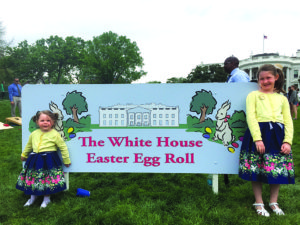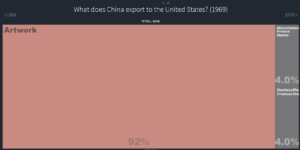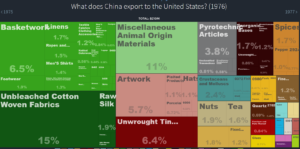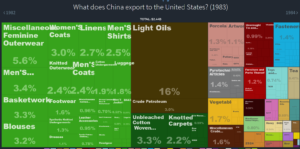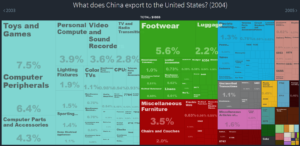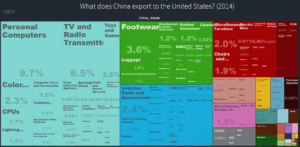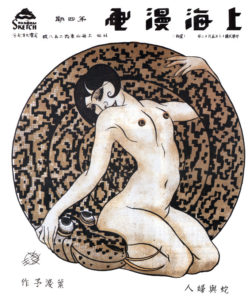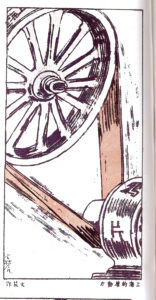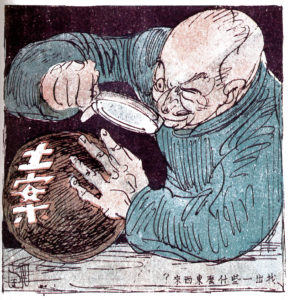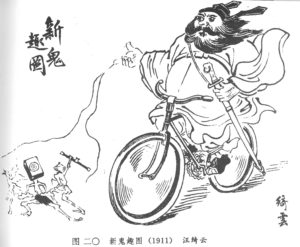On this date, April 25, in 1644 the Chongzhen Emperor, last ruler of the Ming Dynasty hung himself from a tree on Meishan in Beiijng, bringing an end to Ming (and thus Han) imperial rule over China. Of course, if you are a Ming restorationist the dynasty may still be the proper rulers of China even today. Regardless of your political stance, his story is a good one, and the link above summarizes it pretty well.
April History Carnival! #164!

Happy April! Most April Fools Jokes will fall into the May carnival, of course, but I can’t help noting two:
- American Historical Association, which really has stepped up its blogging game, announces the relocation of its annual meeting to a luxury cruise ship, with attendant registration fee increases.
- The American History Museum announced its Smells of American History project, and as Bradley Proctor noted, “I love that most folks are all ‘lol April Fools!’ and #twitterstorians are all ‘finally, this is such a neat idea.’
Speaking of the AHA, Sadie Bergen has a nice look at “Collaborative History Blogs” or, as we used to call them, group blogs. I don’t mind that the defunct HNN group blogs (Cliopatria, Liberty and Power, etc.) aren’t mentioned, or early (if now quieter) special topics blogs (Frog in a Well, Chapati Mystery) aren’t mentioned… actually, I kinda do. NOTCHES, The Junto, S-USIH blog are all excellent projects (as are Active History Canada, Sport in American History, which aren’t mentioned) though they don’t submit stuff to the History Carnival, another phenomenon too old to attract the attention of the AHA bloggers… ok, enough ranting. It’s a decent discussion of the professionalization issue (“recreational” was how one department chair described my blogging), just a wee bit foreshortened. What do we actually have this month?
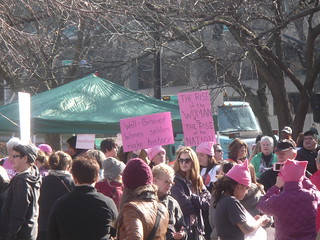 Manan Ahmed on Richard Eaton and Phillip Wagoner’s 2014 Memory, Power, Architecture: Contested Sites on India’s Deccan Plateau, 1300-1600: How To See
Manan Ahmed on Richard Eaton and Phillip Wagoner’s 2014 Memory, Power, Architecture: Contested Sites on India’s Deccan Plateau, 1300-1600: How To See
Brett Holman on The Melbourne balloon riot of 1858
Sharon Howard rounding up her Womens History Month posts and commenting on a few others.
Historian On The Edge with a survey of the immense amount we don’t know about King Arthur as an ahistorical figure
Karl Steel on oddities of Medieval manuscripts, including multicolored crochet repairs
David Bellos, on the publication of his book about the history of Victor Hugo’s Les Miserables
 Robert Smith on the purported anniversary of the first flight of K5054 the Supermarine Type 300 Spitfire prototype
Robert Smith on the purported anniversary of the first flight of K5054 the Supermarine Type 300 Spitfire prototype
Michael Meyer at TNI, on the great 19th century scientist Mary Somerville
Erik Loomis on “This Day In Labor History” looks at a 1959 Mexican railroad strike and the anniverary of Philippine independence
Hels of Melbourne on a failed 1939 attempt to get refugee visas for German and Austrian Jews
Jon Piccini on Human Rights, Women’s Rights and Third Worldism in Mexico City, 1975
VIDA: Blog of the Australian Women’s History Network is another great group blog project, and they had a predictably good Womens History Month!
- Susan Magarey, Catherine Helen Spence: ‘The most distinguished woman they had had in Australia’
- Michelle Arrow, Working inside the system: Elizabeth Reid, the Whitlam government, and the Women’s Movement
- Melanie Nolan, Title of post: Reshaping the Australian Dictionary of Biography: Feminist interventions
- Joanne McEwan and Stephanie Tarbin, Patricia Crawford: Celebrated scholar and mentor
- Anne Rees, Persia Campbell, our woman at the United Nations
- Heather Sheard, Australia’s women doctors in the First World War
- Alison Alexander, Jane Franklin: A life on her own terms
- Sharon Crozier-de Rosa, Uncomfortable feminist icon: Constance Markievicz
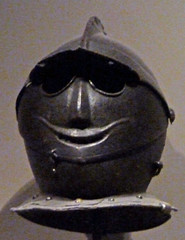 Jessica Cale at Dirty, Sexy History gets the award for the best blog name I hadn’t heard of, and has two posts: The “Poor-Whores Petition” and the Shrove Tuesday Riots on 1668 and Daniel Mendoza and the Modern Art of Boxing
Jessica Cale at Dirty, Sexy History gets the award for the best blog name I hadn’t heard of, and has two posts: The “Poor-Whores Petition” and the Shrove Tuesday Riots on 1668 and Daniel Mendoza and the Modern Art of Boxing
Howard Dorre, The Skinny on John Quincy Adams’s Skinny Dipping Interview and debunking the myth of Anne Royall’s shame.
Speaking of debunking, I got some pushback on my Last Samurai review.
The next History Carnival will be at Yvonne Seale, author of Papal Bull? “The Young Pope” and Teaching the Middle Ages
and Hosts are needed from Jun 2017! Please contact the co-ordinator if interested.
Delayed Reaction, or, I get mail.
In response to my review of The Last Samurai movie, I got the following email yesterday:
Message From: your mom
Message: I read your review of “The Last Samurai”, you sir are an idiot. You must be a liberal left wing piece of garbage. This was an extraordinary film, but i bet you didnt like “Open Range” or “the Passion of The CHRIST”. Liberals are the scourge of the earth. You have a phd in what??< NOTHING. I have three degrees in real science, Geology, Geography, and Physical Science. Science proves the existence of God. I have never read the Bible, but Chemistry, Physics, Mathematics, Biology, etc, PROVE there is a CREATOR. You sir are an idiot, and i hate liberals like you. Good day sir
I can’t wait to see how he reacts to my review of 47 Ronin.
Chiang Kai-shek, Enemy of the People
I have found and interesting source. Dr Jeremy Taylor at the Department of History, University of Nottingham has a site entitled ‘Enemy of the People’. visual depictions of Chiang Kai-shek. As he points out
Chiang Kai-shek was one of the most caricatured, satirised and lampooned leaders in twentieth-century Asia―if not the world…..Unlike many of his fellow dictators, Chiang is impossible to tie down to one particular event, moment or issue…….. He was an anti-imperialist revolutionary, a wartime leader, a defeated militarist, an anti-communist stalwart, an authoritarian despot, and many other things to many different people.
The site is a bit hard to navigate, but there are a lot of good images in there. Most of them are from the 40’s and later, which is too bad. Here is a nice image of him as an authoritarian from Shanghai manhua. I think I have a few from the “Red Chiang” period as well.
Fake News? Chinese Cannibalism Cookbooks?
Sy Montgomery’s review of CANNIBALISM: A Perfectly Natural History By Bill Schutt includes the following paragraph:
Next time you eat Chinese, for example, you might discuss how, during the Yuan dynasty, royalty and upper-class citizens did so, too. So frequently did high society dine on fellow citizens that the various methods of preparing human flesh — including baking, roasting, broiling, smoke-drying and sun-drying — filled 13 pages of one book Schutt consulted. (Children were considered the tastiest, followed by women and last, men.) In fact, so-called epicurean cannibalism — that is, eating your fellow men/women/children because they taste good and not just because there’s nothing else in the house — was still widespread in China into the late 1960s during the Cultural Revolution.
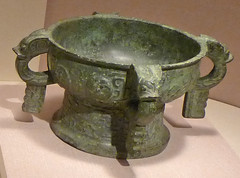 I know there are documented cases of cannibalism in Chinese history (Great Leap Famine), and plenty of food crises in which cannibalism was at least widely rumored (including the Yuan era), but for all of the “The Chinese Will Eat Anything” articles I’ve seen, I’ve never seen a claim of anything like this. Schutt is, apparently, a biologist and the review claims that he’s interviewed and consulted anthropologists. My immediate reaction is that he can’t tell the difference between a satire and a supernova, and has fallen prey to the “primary sources must be true” school of amateur historiography.
I know there are documented cases of cannibalism in Chinese history (Great Leap Famine), and plenty of food crises in which cannibalism was at least widely rumored (including the Yuan era), but for all of the “The Chinese Will Eat Anything” articles I’ve seen, I’ve never seen a claim of anything like this. Schutt is, apparently, a biologist and the review claims that he’s interviewed and consulted anthropologists. My immediate reaction is that he can’t tell the difference between a satire and a supernova, and has fallen prey to the “primary sources must be true” school of amateur historiography.
However, I’m open to the possibility that I’ve just missed out on these sources, and that every other food historian and anthropologist who’s studied China has missed them as well, or decided to keep them a trade secret. (credit to Matt Thomas for bringing this to my attention)
Anyone want to weigh in?
p.s. The most comprehensive source I’ve found so far is Sutton, Donald S. “Consuming Counterrevolution: The Ritual and Culture of Cannibalism in Wuxuan, Guangxi, China, May to July 1968.” Comparative Studies in Society and History 37, no. 1 (1995): 136-72. www.jstor.org/stable/179381. This is an attempt to put Zheng Yi’s account of the 1968 Wuxuan county wave of cannibalism into cultural context, but doesn’t support either of the claims above, either that cannibalism was “widespread” in the Cultural Revolution (though I guess that would depend on your definition) or the Yuan cookbook. It does corroborate the tradition of using human body parts as medicinal ingredients/sacrifices and some ritual consumption of defeated enemies, at least in stories.
Diaspora experience as a function of modernity, imperialism, and nationalism.
From my online course on Asia-US migration, an upcoming discussion:
The second half of [Vinay] Lal’s book [The Other Indians: A Political And Cultural History of South Asians In America] is our first detailed look at the post-1965 Immigration Act situation, and particularly interesting look through the lens of Diaspora. South Asian immigrants to the US are just as connected to their homelands as pre-war Japanese or Chinese immigrants were, and though the technologies of interaction are dramatically more effective, a lot of the dynamics are familiar. Reinvestment of income in family communities, development of local cultural institutions, 2nd generation cultural gaps, aspirational tensions, redefinition of ‘culture’ to be a narrow subset of hobbies and traditions, returnee issues, ethnic nationalism and overseas influence issues, etc. You could even argue that the influence of Indian religions in non-Indian Americans (ISKCON, Vivekananda, etc.) parallels the influence of Zen Buddhism as an attempt to find new and alternative non-Western spiritual traditions.
A few months ago I came across Wajahat Ali’s play “Domestic Crusaders” (http://www.domesticcrusaders.com/, where you can download the script for free) which is a family drama based on 1st and 2nd generation Pakistani immigrants in the US. It is funny, touching, tense, and lively, and nothing in it was the least bit surprising to someone like me who grew up with family dramas based on 1st and 2nd generation Eastern European Jews.
This is why, honestly, “Diaspora” is such a useful scholarly term: there really are patterns, comparisons, predictable developments. Historians often shy away from that sort of talk, because we’re more interested in particularity and complexity, but sometimes we have to admit that the sociologists are on to something. This leaves us with two questions: Why? and Within the pattern, how is each one distinctive and unique?
I think the “Why?” question is pretty easy, actually, especially in the US where persistent racism makes it hard for even third-generation Americans to be considered fully mainstream and acceptable. That tendency to exclusion enhances what might be considered the ‘natural solidarity’ of immigrants who share linguistic and cultural characteristics. The modern infrastructure of transportation and communication means that immigrants can and will remain in contact with home countries, and contribute economically, but also have resources with which to implant and expand their home cultures locally. This is enhanced on both sides by the discourses of modern nationalism and the nation-state which, even in the America, define citizenship culturally as much as legally. The combination of modernity – in which anxiety about ‘kids these days’ is a constant feature (though it does go back a long, long way in human societies) – and the sensation of being on a cultural frontier enhances tensions between assimilation and preservation of culture in the 2nd generation. Even in the 1st generation, the impossibility of fully replicating the home environment (both due to distance, and the fact that things change, even in the homeland) means that their attachment to home becomes more focused on particular aspects of home culture (religion, or certain cultural activities) and allows for a great deal more assimilation than they will admit (until they try to go back…). These patterns are structural, building on the most fundamental aspects of modernity: nationalism, infrastructure.
That last paragraph is kind of ambitious, but I might work up a presentation expanding on it…
Oh, internment again.
This is something I wrote for my Asia-US migration class this week. We’re reading Erika Lee’s The Making of Asian America. You can figure out which bits, I think…
You’d think, reading Lee, that most of the critical questions surrounding the internment of Japanese immigrants and Japanese Americans during WWII were pretty clearly settled. You’d be wrong: Joseph Shoji Lachman, “I can’t believe I’m responding to another pro-Japanese Incarceration piece.” 30 January 2017. Lachman’s frustration stems at least in part from the fact that this is an historical battle that has been going on for over a decade, since Michelle Malkin published her book In Defense of Internment: The Case for Racial Profiling in World War II and the War on Terror. This was in the relatively early days of blogs, and history blogs in particular were quite active. She was answered quite vigorously by a number of scholars, including myself: the most effective were Dave Neiwert (better known for his work on right-wing militias and conservative politics, which gave him a solid background in Malkin’s political foundations), Eric Muller (lawyer and historian, author of American Inquisition: The Hunt for Japanese American Disloyalty in World War II) and Greg Robinson (who had already published one book on Japanese internment, and would go on to publish A Tragedy of Democracy: Japanese Confinement in North America which helpfully added Canada to the history, and which Lee has drawn on heavily in her Canadian sections). You can see one of Greg Robinson’s responses here and one of Eric Muller’s here and even one of mine here If you want the full debate, you can still find Robinson and Muller’s joint blogging reviews
Fundamentally, defenses of internment boil down to a few core arguments, none of which I find persuasive:
- Fear of unrest, because of panicking racist non-Japanese (which was a consideration, according to US officials at the time). Essentially a form of blaming the victim, or if you want to put it in the nicest possible way, sacrificing the rights of the minority to protect them from the majority.
- Cautionary principle, based on extreme risk-aversion (a very popular argument right now, as it turns out), which basically allows any remotely plausible scenario to justify overwhelming force; actual evidence helps, but it isn’t necessary.
- “It worked, didn’t it?” In other words, since the policy was carried out successfully, the necessity for it must be assumed. This is particularly popular in the debates about the use of atomic weapons in WWII as well.
- Rational reaction to available information. This is more or less the tack that Malkin took, though she abused her sources viciously to arrive at her conclusions. This is an argument to which historians are really more sympathetic generally, because it involves taking the mindset (or mentalité, to use the original French) of historical actors seriously, but for it to work requires proving that the information was available and credible, that countervailing information was not (available or credible, or both), and that the reaction is rational and proportionate. Lots of moving parts, and lots of places where it can fail.
Of course, the historian’s job is easier if it’s about causality and complexity and not about justification. In fact, it could be argued that political justification and ethical considerations aren’t entirely appropriate historical theses. If all history was done by academic historians, it’s possible that they would never come up, but one of the great things about history is that it matters to everyone. People take their histories seriously, and use historical examples to justify their present actions. Ethics and politics are embedded in everything we do, sometimes subtly and sometimes terribly obviously. We are mostly narrative thinkers, and the stories we tell can be very persuasive.
Teaching export-led growth
Do you teach about export-led growth in Asia? Like to talk about the process of oh, say China, gradually exporting increasing amounts of stuff to the U.S., and moving up the ladder from cheap labor intensive goods to more high-tech stuff?
Luckily, MIT can help you visualize this for your students.
Here are China’s exports to the US in 1969.
Not much, and most of that Mao posters, I guess. By 1976, the year Mao died, things have changed some.
Art is still there, but unwrought tin, unbleached fabric and baskets have passed it. Still seems like a pretty low end collection of stuff. By 1983 the reforms have started.
Light oils are on top, but lots of clothing as well. Take advantage of that cheap labor! By 1992, three years after nothing happened in China, we are well on our way.
Lots of clothing, but also toys and consumer electronics. Also note that crude petroleum is still being exported. China produces it, but does not have enough cars to use it all up. Here is 2004.
Electronics have taken over from clothes, and computer stuff surpasses games. Also lots of furniture and almost everything else. China really has become the world’s factory. The last year they have data for is 2014.
368 billion dollars of imports, and personal computers are the largest item. By comparison, here are US imports to China in 2014
Soybeans and cars. That’s my U.S.A.!
Anyway, it is a fun tool and you can easily generate some good classroom stuff with it.
A thought on military and transnational history in lieu of a review
In that odd lull between end-of-semester grading and final exam grading, I finally got around to reading that interlibrary loan book that was due last Friday, Kenneth Swope’s A Dragon’s Head and a Serpent’s Tail: Ming China and the First Great East Asian War, 1592-1598 (U Oklahoma Press, 2009). As a world historian, I’m always looking for good world history, especially transnational history that touches on my field, and the Hideyoshi invasions of Korea and the Korean-Ming Chinese defense is a fantastic case study … in something. The only full-length study I’ve read on them is Turnbull’s, though there clearly is more scholarship out there (See the comments) than I’ve run across. I’d love a good, recent book in print that I could assign students (Turnbull’s out of print and, well, Turnbull), and I’d love to see these wars taken seriously as transnational history.
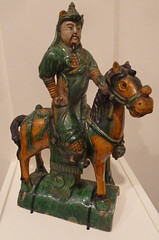 Swope’s book isn’t bad, certainly, and it’s particularly interesting for the argument he’s making about late Ming military capacity (much, much better in quality and quantity than they get credit for) and leadership (maybe time to stop assigning Huang’s 1587…), as well as a much more complete picture of the military action and Korean agency in the military and political process. As a military history, perhaps even falling into the “New Military History” category, it’s quite a substantial work. From the conclusion:
Swope’s book isn’t bad, certainly, and it’s particularly interesting for the argument he’s making about late Ming military capacity (much, much better in quality and quantity than they get credit for) and leadership (maybe time to stop assigning Huang’s 1587…), as well as a much more complete picture of the military action and Korean agency in the military and political process. As a military history, perhaps even falling into the “New Military History” category, it’s quite a substantial work. From the conclusion:
In describing the “modernization” of European armies, William McNeill discusses such factors as civilian control of supply lines, regular payment of the soldiers with tax money, the differentitation of military units, and the tactical coordination of cavalry, artillery, and infantry. Of course, all of these characteristics can be found in the armies involved in the First Great East Asian War. Scholars also deem the role of repetitive drilling and standardization of training techniques crucial to creating modern military forces. The introductio of Ming general Qi Jiguang’s training manuals to Korea was of much importance. Drawing upon Qi’s model, the Koreans later created their won martial-arts treatise, the Muye dobo tongii which includes a sword form attributed to Li Rusong. The allies also participated in sophisticated amphibious operations and in joint land-sea attacks. Even the use of maps and the creation of joint-planning operations by the allies predates such activity in Europe by some two centuries. (299)
That said, I have some qualms about assigning it to students. First, it’s overwhelmingly military history, so that the cultural and political and economic elements of the history are secondary and the pre/post-war are handled in a fairly perfunctory fashion (though some good points are made, especially about the Japan-Korea relationship). That’s fine if you’re interested in military history (and I’ll certainly recommend it to my military historian colleague, and any students so inclined) but it’s not really the kind of history I’m trying to present to my students, mostly, especially in 300-page doses. A book that boiled the military history down to about two chapters in the middle of serious pre/post analysis would be more like what I’m looking for as a textbook…
As history writing, it’s not the best model for students, either. The only times the term ‘revisionist’ is used, it’s used pejoratively, despite the fact that this work (like all argumentative histories) is revisionist towards previous scholarship, etc. “Historiography” also comes up, but only in conjunction with partisan perspectives. There are some lovely discussions of moments where the Chinese, Korean, and/or Japanese sources differ on facts (lots of figures, too) but no sense of how to resolve such differences, or even if resolving them is worthwhile. Then there’s the vast majority of the rest of the book, which presents a straightforward factual narrative with no discussion of sources outside of the endnotes. There are one or two exceptions where personal diaries of witnesses are invoked, but no analysis of credibility; they’re just witnesses.
Military history often is a kind of transnational history, though not one that world history people have given much credit or credence to (and vice-versa). Swope has a nice touch with the diplomatic history around the war (though his focus on China means much more sophisticated institutional history on the “Allied” side) and handles cultural issues well, though not deeply.
Swope does point in the direction of some of what yet needs to be done on the war, including a careful consideration of the role of captured Koreans in Japan as forced labor, the integration of Chinese (and some Japanese) who stayed in Korea, the post-war prisoner exchanges (which continued through about 1605 [I had to return the book this afternoon, so I can’t check]). Naturally, I noticed all the migration stuff. I’m sure there was more…
An update on the Marco Polo problem
I said when I introduced the History Carnival that I’d been doing a lot of private blogging in the form of online course materials, and I really should share some of that. It turns out that I just wrote a piece that might well be interesting to our readers:
In the first edition of Open Empire, published in 2000, Valerie Hansen expressed a frustration common among Asian history scholars, with European Marco Polo scholars who insisted on the truthfulness and reliability of his Travels:
Anyone reading Polo’s account has to question the reliability of what he says about China. Sources external to his memoir do not record his presence in China, much less his service in the positions he professes to have held. He claims to have built the Mongols the catapults that made it possible for them to take Xiangyang in 1268 — two years before his arrival in China. Further casting doubt on his account, Chinese sources record the fall of the city in 1273 with the help of Arab — not European — engineers. Polo says he served as governor of Yangzhou, but the ists of governors are complete and do not give his name.
…
As is well known, Marco Polo wrote his account in prison during 1298 and 1299, assisted by Rusticello de Pisa, who specialized in romances, and who, like many modern ghostwriters, felt no compunction about embellishing the truth to enhance the readability of his account. One scholar has shown that Khubilai’s welcome to Marco was simply lifted from Rusticello’s rewrite of the passage from the Arthurian legend when Tristan first goes to court.
…
As his account meanders from place to place, he sometimes records the number of days necessary for the journey, sometimes not. At times large chunks of the itinerary are left out, and he writes as if he flew to the Mongol capital. The reader never learns the grittydetails of the trip. With whom does Polo travel? What does he eat? Where does he stay? What language did he speak? Who were his interpreters? Further undercutting his credibility, his account suffers from a mind-numbing repetitiveness. In almost every city in China he records, ‘The inhabitants are idolators and burn their dead. They are subject to the Great Khan and use paper money,’ or some variation of this formula. The typical passage about a given place will mention its major products, such as silk, jujubes, foodstuffs, or armaments, comment on the numbers of ships there, and then lurch to the next site.
Despite its formulaic narrative and outright inventions, one cannot reject Polo’s account totally because it occasionally includes kernels of important information. One has to wonder when Polo reports that women test brides for their virginity by scratching thier hymens with a clean cloth, ‘so that the linen may be slightly stained with the virginal blood,’ which cannot be washed out. But when Polo records ‘ to ensure this strict preservation of virginity, the maidens always walk so daintily that they never advance one fvoot more than a finger’s breadth beyond the other,’ it seems as if he is actually describing the effects of footbinding. Marco seems to know about practices with which people in Europe could not have been familiar: he meets a spirit medium who specializes in finding lost or stolen goods, and he describes the Chinese custom of equipping the dead with ‘horses and slaves, male and female, and camels and cloth of gold in abundance — all made of paper!’
…
What we have in Polo’s Travels, then, is the strung-together accumulated hearsay of travellers who went to China. Some Europeans did make the trip, as the tombstone of the daughter of an Italian merchant shows. Some of the expressions Polo uses are Persian, suggesting his informants could have been from Iran. Failure ot visit China would not have prevented Polo from writing. His contemporary Pegolotti wrote a dry book that gave price data from China, yet its author had never journeyed there. In an age when so few Europeans had been to China, one could easily write about it on the basis of others’ reports.” (344-347, emphasis added)
Hansen’s view, supplemented by critical work by Frances Wood, informed my own. I wrote in 2004: “Let me say this clearly and plainly: Marco Polo did not go to China, Marco Polo did not work for the Mongol Yuan Dynasty” (http://historynewsnetwork.org/blog/6746, emphasis in the original). I moderated my view slightly in 2012 after reading a very ambitious attempt to match Polo’s biological and financial data to medieval Chinese equivalents, arguing that Polo partisans were too biased to effectively evaluate the flaws in his work, but that skeptics had only a circumstantial case against it, and that there was no way to adjudicate the dispute without ‘smoking gun’ sources that probably don’t exist, if they ever did:
Polan loyalists are already convinced that Polo’s claims are valid and useful, except where directly contradicted by evidence. But they are not going to convince Polan skeptics of the truth of Polo’s claims except by verification. And the amount of work necessary to make a good case of Polo is the best evidence that Marco Polo’s Travels is a bad historical source that should not be relied upon for anything which cannot be independently verified. (http://www.froginawell.net/china/2012/09/reconsidering-marco-polo/)
I remain more or less in the same place at this point. I still think it’s more likely that Marco Polo was a secondary source, not a primary source, a fiction based on facts.
Hansen, though, has moved even futher, and so the current edition of The Open Empire (2015) is more even-handed, weaving substantial new claims in among the skeptical material of the earlier edition:
While some scholars argue furiously that Travels offers better information about the places Polo visited than any other book, orhers, equally certain, counter that the book contains many factual errors. In fact, both scholarly camps can find evidence to support their differeing views: some parts of Polo’s account are accurate, others are not.
Travels does make some false claims. …
Still, other indications support Polo’s claim to have visited China. … Polo’s description of their jouney tallies with Chinese accounts, which do not, however, explicitly mention the Polos by name. Moreover, when Polo died, his will listed his possessions, one of which was a paiza tablet of authority, a travel pass that allowed the bearer to travel throughout the Mongol empire as the khan’s representative. Polo must have recieved the pass from the Mongol ruler.
We must remember that the historical record is far from complete…
The scholars who argue for the reliability of Polo’s book also have persuasive evidence. Polo occasionally relates kernels of important information. One scholar has recently shown that Polo’s description of Chinese paper money is the most detailed account in any language: it explains how the Chinese made, employed, and replaced the notes. … (318-322, emphasis added)
Hansen presents the paiza travel tablet described in Polo’s will as decisive evidence (also on 326), but I’m not convinced, any more than I was. We don’t have the tablet itself, or a physical description of it in any detail, and given the intelligence Polo did have about the Mongols, he could have known enough about them to purchase something or fabricate something suitably impressive to otherwise ignorant European audiences.
China from “Over There” to “Back Then”: A Second Helping on E.A. Ross
Alan Baumler’s juicy February 19 post “Edward Alsworth Ross and The Good Old Days of Scholarship,” inspired me to look back through my notes.1 E. A. Ross (1866 to 1951) was a Progressive Era founder of professional academic sociology who got it into his head to spend the better part of a year in China. He published The Changing Chinese: The Conflict of Oriental and Western Cultures in China (New York, Century 1911) just as Sun Yat-sen’s revolution was breaking out.
The lead sentence of the first chapter is “China is the European Middle Ages made visible.” The idea seems obvious now: Karl Marx had already said in his 1867 Preface to Das Kapital “The country that is more developed industrially only shows, to the less developed, the image of its own future.”
But to most Westerners at that point, China was the “Far” East. China was unique, exotic, and far away; it took weeks and weeks to get that upside-down and opposite wonderland. Ross and Marx used a different set of categories. They agreed on little else but they both now saw China not as far away in space but as one or two rungs below on the ladder of universal history. China was not “over there” but “back then.”
Ross was a founding member of the American Sociological Association that professionalized academic study of society (he was its president in 1914-1915). He gave the back of his hand to the “old China Hand” and “old treaty-port residents” who saw China as exotic:
The theory, dear to literary interpreters of the Orient, that owing to diversity in mental constitution the yellow man and the white man can never comprehend or sympathize with one another, will appeal little to those who from their comparative study of society have gleaned some notion of what naturally follows from isolation, the acute struggle for existence, ancestor worship, patriarchal authority, the subjection of women, the decline of militancy, and the ascendancy of scholars. (Preface)
The “literary interpreters of the Orient” perhaps included Rudyard Kipling, who swore that “East is East and West is West and ne’r the twain shall meet” or even the people who talked about “eternal China” and the “unchanging East.” For the sociologist, China was not even mysterious:
The fact is, to the traveler who appreciates how different is the mental horizon that goes with another stage of culture or another type of social organization than his own, the Chinese do not seem very puzzling…. They act much as we would act under their circumstances. (Preface)
So let’s not begrudge Ross a little credit – the title of his book is “The Changing Chinese” not “The Eternal Chinese.” But we then have to ask just what would change them and what they would change into.
Ross knocks those who see a “diversity in mental constitution” but his book is still a catalogue of blithe, earnest racial stereotypes. He wonders at “Chinese toleration of noxious microbes,” which is “not likely to be developed in other races”; their “bluntness of nerve”; “their response to stimuli slow but strong and persistent”; their “struggle for existence,” which leads to “cheapening of human life”; “inefficiency of native management”; and, well … you get the point. No wonder he opposed Chinese immigration and on largely racist grounds.
In the quote, he speaks of “another stage of culture or another type of social organization” and the “comparative study of society.” With only a little adjustment, what Ross is touting is modernization theory. He urges China to conduct a going-out-of-business sale: everything must go! There’s nothing wrong with the Chinese brain or ability, it’s just that “pitting the China against a West armed with this technique of success is like pitting the sixteenth century man against the twentieth.” (p. 316)
Where will this change come from? “When the Chinese become sensible of the inferiority of their own culture, Christianity presents itself to them clothed with prestige,” and Christianity is “in close association with a material civilization so successful that China will be obliged to adopt it in its entirety in order to survive.” (p. 258). (You might want to read that over again – yes, you read it right.)
If you can’t resist looking for yourself, there’s a free access copy of The Changing Chinese at Internet Archive: here.
Charles W. Hayford, “China by the Book: China Hands and China Stories, 1848-1948,” Journal of American-East Asian Relations 16.4 (Winter 2009): 285-311. ↩
History Carnival #160
Welcome to the November 2016 History Carnival!
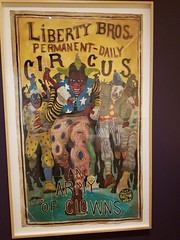
It’s been a while since I hosted a carnival, and a while since I was blogging regularly, as well. Unless you count Twitter, in which case I’ve been blogging up a storm. Similarly, if you count the writing I do for my online classes, which is a lot like private blogging, there’s been gobs of that, too, which I really should share more of. These images are all from my various wanderings, and have very little to do with the posts.
But, on to the carnival!
Caroline Rance, Victorian asthma cigarettes: who was Dr Batty? at The Quack Doctor
Ana Stevenson nominated some excellent stuff from VIDA: Blog of the Australian Women’s History Network
- Marian Quartly, Marital Separation and Family Heroines
- Laura Rademaker, The Stolen Generation: motherhood in black and white
- Susan Currie, Sexual harassment in universities becomes visible … again
- Kiera Lindsay, The Convict’s Daughter: Speculations on Biography
- Anne Rees, A different view of women: Mentors, Australian women professionals and the United States
Ross Mahoney passed along this series from Johannes Allert,
- A Case of Mistaken Identity: Colonel Edgar Stanley Gorrell – Part 1: Early Life
- A Case of Mistaken Identity – Part 2: The Emerging Role of Civil Aviation in Air Transport
- A Case of Mistaken Identity: Colonel Edgar Stanley Gorrell – Part 3: Postscript
From Yvonne Seale, The Veil in the Middle Ages 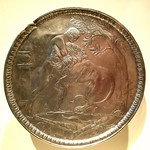
David Brooks suggested some interesting US history
- Lawrence P. Gooley, Karl Frederick, Adirondack and National Conservationist The New York State History Blog
- Kelli Huggins, This Story is Bananas!. Chemung County Historical Society
- J. L. Bell, Expanding the Extended Washington Family, Boston 1775
- Nolan Cool, Visions West: Robert Hunter, Fort Hunter, and the Fur Trade. The Friends of Schoharie Crossing
- Joseph M. Adelman, A Resource I Want: The Bible in Early America. The Junto
That was all of the nominated posts, and some solid material. I wanted to supplement a bit with some of my regular reads: 
- Kevin Levin, Are SCV Members really losers?”, Civil War Memory
- Mattie Finch, Hitler, Fascism, and Demagoguery, US Intellectual History Blog
- Jack El-Hai, The Knights of the Forest Fought to Eliminate American Indians, Wonders and Marvels
- Jeremy Young, Trump, the GOP, and the Bloody Shirt, US Intellectual History Blog
- Robert Smith, Sputnik 1, Rambles in the Air
- Ravynn Stringfield, The Transnational Road to Graphic Novels and the American Superhero, US Intellectual History Blog
- Erik Loomis, This Day in Labor History: October 31, 1978: the Pregnancy Discrimination Act. Lawyers, Guns & Money
And that’s the lot! The December Carnival will be hosted by Christopher Moore’s History News and submissions should go to historycarnival.org.
Chinese Manhua and social criticism
I have been preparing a paper for a conference here at IUP, but since the conference is postponed as we are on strike I thought I would share some of it with you here. The paper is “Zhang Guangyu’s Xiyou Manji (Manhua Journey to the West) (1945) and the Chinese Tradition of Visual Satire” and I am doing it for a conference on comics that our English department is hosting. Mostly I am just doing it to introduce some stuff about Chinese comics, leading up to Zhang’s 1945 work, which I would claim is maybe China’s first manhua, in the sense of a graphic novel1 For those of you who don’t know the work, Nick Stember has put the whole thing on-line. It is basically a wartime adaptation of Journey to the West.
 I talk about how Xiyou Manji is important in terms of format and design, but also in its criticism of the government. Zhang Guangyu, the author, had a long history as a manhua artist, and I look at the stuff he did and published as the editor of Shanghai Manhua
I talk about how Xiyou Manji is important in terms of format and design, but also in its criticism of the government. Zhang Guangyu, the author, had a long history as a manhua artist, and I look at the stuff he did and published as the editor of Shanghai Manhua
in 1928-1930. Manhua artists and magazines tended to get into political trouble, and they did post some stuff that would seem to lead to trouble, like this caricature of Chiang Kai-shek.
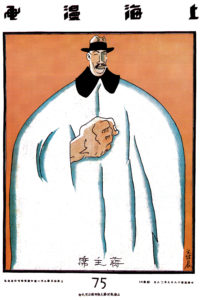 There were a couple of things that kept them on or near the right side of the censors, however. One was the fact that they tended at this point to focus on social criticism of the corruption in Shanghai society, a topic where Nanjing might agree with them, and they did it is a foreign, modernist idiom that was not likely to get much traction with the masses.
There were a couple of things that kept them on or near the right side of the censors, however. One was the fact that they tended at this point to focus on social criticism of the corruption in Shanghai society, a topic where Nanjing might agree with them, and they did it is a foreign, modernist idiom that was not likely to get much traction with the masses.
The other thing was that things like caricatures were clearly critical, they were not very pointed. Apparently you could get away with vague criticisms of leaders, but not with specific policy criticisms.
The closest I found to policy criticism in Shanghai Manhua was their treatment of the 1929 Jiangan opium case, in which a shipload of opium that was pretty clearly being protected by someone high up in the government was seized. The case was never never solved, and2
There were plenty of cartoons about it. Here we have “powerful people” grabbing opium money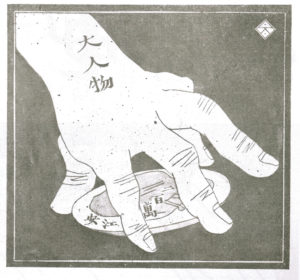
and here we have opium as Shaighai’s motor.
What we don’t get is much specific criticism of these important people. Who is responsible for this case? Its a mystery!
We do eventually get some things about minor figures involved in the case, but this is a long was from the type of explicit stuff cartoonists will do later, and that Zhang will do in 1945. A number of scholars have called the Shanghai manhua apolitical, and I think that is clearly wrong, a lot of their social criticism stuff is clearly political. Still, the political stuff they do is far less pointed than what will come later.
Part 1 of …..
And now, just for the fun of it, a 1911 cartoon of Zhong Kui the demon queller on his bike from 19113
I am not that hung up on “firsts”, but for this paper it works. ↩
There is a bit more on the case here Baumler, Alan. The Chinese and Opium under the Republic: Worse Than Floods and Wild Beasts. Albany: State University of New York Press, 2007. p.136. ↩
from Bi Keguan, Huang Yuanlin Zhongguo manhua shi Beijing: Wenhua yishu chubanshe, 1986 ↩
Books with “Laozi” on the cover
Konrad called my attention to Paul R. Goldin’s “Those Who Don’t Know Speak: Translations of the Daode Jing by People Who Do Not Know Chinese.”1 As you might expect, Goldin is not much impressed with the publications of Witter Bynner, Stephen Mitchell, Thomas H. Miles and Ursula K. Le Guin.2 All of them have consulted some of the many English translations of the work, some of them talked to some Chinese people or scholars about it, and then published a book with “Laozi” on the cover. Goldin is not impressed with the books these people “expectorate”, and spends some time, too much, really, laying out how bad these works are as translations. After some time spent shooting fish in a barrel, Goldin gets on to what I find most interesting,…what it is the that modern English-reading world wants out of Laozi in particular and Taoism/Buddhism/Hinduism more generally?3 Publishers do it because it makes money, of course, and so do at least some authors. Mitchell got a six-figure advance for his book, (in 1988 dollars) and has no doubt long since earned it back. This of course just pushes the question back to why readers buy books like these, and Goldin looks at Amazon.com reviews,4 and finds that
The respondents like the pseudo-translations because, of the available choices, these are the most easily adaptable to their own experience. Scholarly translations seem pedantic to them
Goldin, of course, disagrees, possibly because he himself is a dry as dust scholar who lacks the soul of a poet, or he is just jealous of six-figure advances. Or, possibly, because
The Daode jing is old; it is alien; it is Chinese; and it is difficult. These are the recalcitrant facts that too many readers seem disinclined to accept. Instead, they seek out the most facile translations and consume insipid approximations of the original….. Like any profound work of philosophy, the Daode jing is dangerous. We do it no justice by pretending that it is easy to swallow.
So how do you render Laozi easier to swallow, and avoid the threat that someone might crack their teeth on it?
Here, from C-text is the first line of Laozi 465
天下有道,卻走馬以糞。天下無道,戎馬生於郊
Victor Mair renders this as
“When the Way prevails under heaven,
swift horses are relegated to fertilizing fields.
When the Way does not prevail under heaven,
war-horses breed in the suburbs.”
Mitchell gives us
“When a country is in harmony with the Tao,
the factories make trucks and tractors.
When a country goes counter to the Tao,
warheads are stockpiled outside the cities.”
There are problems with the Mitchell just as a literal translation, (天下 as country? ) and also as prose. You loose the parallelism between horses and horses by turning them into factories and warheads, and warhorses breeding (生) seems better than “stockpiling” as a verb here. If you get away from the Dao, warhorses will apparently breed without you having to do anything more. Stockpiling shifts the focus to whoever is stockpiling.
Still, if unlike Goldin you don’t find Mitchell’s changes “jarring” this is more or less a translation, and it saves modern readers the trouble of having to consult a footnote to find out what a horse is by putting things in a modern idiom. Sometimes the modern book-issuers flat out edit the text.
Here is Wing-tsit Chan’s translation of the end of Laozi 25
Therefore Tao is great.
Heaven is great.
Earth is great.
And the king is also great.
There are four great things in the universe, and the king is one of them.
Man models himself after Earth.
Earth models itself after Heaven.
Heaven models itself after Tao.
And Tao models itself after Nature.
Le Guin deals with this unpleasant mention of a king by taking the whole section out, explaining “I think a Confucian copyist slipped the king in. The king garbles the sense of the poem and goes against the spirit of the book. I dethroned him.”
This is actually a problem for a lot of these book-issuers. All of them dislike the idea that a book that they all know the meaning of might have references to kings and political power. Indeed, they have problems with the whole de aspect of the Daode jing.6 I actually like that ‘part’ myself, since I am usually, either in class or in my own head, trying to connect this book to other Chinese books of the period, most (all?) of which, like Laozi, are concerned with politics and ordering human societies. They are trying to connect it to themselves and what they already feel.
The Amazon reviews remain a rich source for understanding how book buyers (and my students) want to approach Chinese texts. The Penguin edition of the D.C. Lau translation of the Wang Pi text is a seminal work in part because it was the first one I ever read. It has 855 reviews at present. Like Amazon itself, many of the reviewers are in fact reviewing other editions, but never mind that. Here is one of the reviews of Lau that the Amazons found most helpful.
on October 30, 2005Format: PaperbackVerified Purchase
Asian Philosophy 12, no. 3 (November 2002): 183. ↩
He identifies Le Guin as “the daughter of the famous anthropologist A.L. Kroeber” which I did not know, but which I would also not think of as a way to define her. ↩
All of these are the same, by the way “Although [Hinduism, Buddhism, and Taoism] comprise a vast number of subtly interwoven spiritual disciplines and philosophical systems, the basic features of their worldview are the same” ↩
in 2002, no less. Is this the earliest scholarly citation of Amazon reviews? ↩
46 is Wang Pi, yes? Lau’s Everyman edition says this is Mawangdui Te Ching 9 ↩
As Goldin points out, this is one of the most difficult terms in the text ↩
None of the books Goldin talks about seem to have any questions about the existence of Laozi and his relationship to the Daode jing ↩

